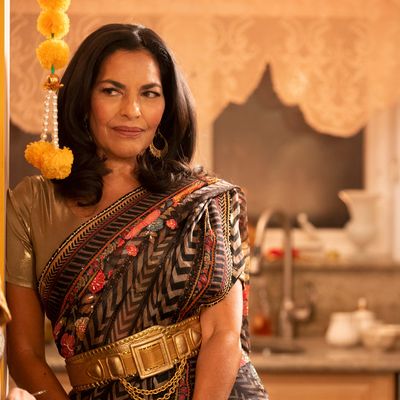
Sex and the City, a series that revolved around the brunching and dating habits of four white women, was never known for its cultural sensitivity. Carrie infamously called bisexuality “a layover on the way to gaytown.” Jewish men were portrayed as undesirable; Asian women played maids to white men. Samantha was constantly slut-shamed, even by her friends. One of the few times the show depicted an interracial relationship — Samantha dating the Black music mogul Chivon — she adopts a Blaccent. And Just Like That …, the SATC reboot that premiered last month, seems at least somewhat aware of that history. In the lead-up to the show’s launch, a number of new, notably diverse cast members were announced, including Nicole Ari Parker, Karen Pittman, Sarita Choudhury, and Sara Ramirez.
But from the beginning, the reboot’s handling of diversity has plodded along awkwardly. The BIPOC characters barely appear outside the story lines of the original (mostly white) cast, who can’t seem to stop embarrassing themselves. In the first few episodes, Miranda repeatedly puts her foot in her mouth with her professor, Dr. Nya Wallace (Pittman), making cringe-worthy comments about her hair and race until, miraculously, the two women become friends. Meanwhile Charlotte befriends fellow mom Lisa Todd Wexley (Parker), only to fret about how it will look that she has no other Black friends to invite to her dinner party, eventually going as far as to actually confuse one Black woman for another.
The series may have added new characters, but it’s hard to escape the sense that they exist solely for the original cast to learn about diversity — like mirrors to allow them to see themselves in new and progressive (?) lights. Still, I had high hopes for Seema (Choudhury). When we meet the high-powered real-estate agent in episode four, it’s clear she’s a woman of command and self-possession, crushing a cigarette as she steps out of a luxury car. She wears cheetah-print pantsuits and is generally fabulous, quickly befriending Carrie. But of course, when the show finally turns its attention to her character, what do we end up with? In this week’s episode, titled “Diwali,” a tired arranged marriage conflict with Seema’s Indian parents.
Things kick off when Seema brings Carrie to a “sari” store downtown, telling her that, in India, Diwali is a celebration of “light triumphing over dark,” but that in Queens it’s an occasion for her family to ask why she isn’t married and pressure her about an arranged marriage. Never mind that Seema is 53. It seems as if the show’s writers heard “Indian woman” and this was the only plotline they could think of.
A self-professed “bad Indian daughter,” Seema tells Carrie that her parents want her to have an arranged marriage because they “won the lottery” with a successful one and learned to love each other. However, we never get any deeper into the issue than that. It’s not that the “arranged marriage” trope doesn’t have any truth to it. But without specificity, it just feels superficial and like a hollow way to tell stories about brown women.
Upon hearing about Seema’s dilemma, Carrie invites herself to her family’s Diwali, getting Seema’s permission to pick out a sari. (And prompting the line: “It’s cultural appreciation, not cultural appropriation.”) This — a white person showing up in a sari — might be the most realistic thing about the episode’s portrayal of the holiday. (Though, it’s worth noting, as Praachi Raniwala points out in the New York Times, that what Carrie refers to as a “sari” is in fact a lehenga, a traditional three-piece garment.) Otherwise nothing remotely Diwali-like or festive happens. There are no diyas or sparklers or even anyone eating, which is odd, because food is undoubtedly one of the highlights of the celebration. It could be any party, except for the contrived “drama” around the white boyfriend. As soon as they’re introduced, Seema’s parents grill Carrie about Seema’s imaginary boyfriend, “Dennis,” who Seema later informs Carrie is white so that her parents won’t be completely devastated when they break up. But instead of being a clever one-liner, it just feels like another tired stereotype: an Indian woman rebelling against her family with a white boyfriend (and reinforcing white male desirability in the process). And even this clichéd conflict comes across half-baked: Despite the show’s clumsy assumptions about Indian parents, Seema’s seem unconcerned with Dennis’s whiteness and appear to actually just want their daughter to be happy. While it’s true that they seem to associate a woman’s happiness with romantic partnership, that isn’t necessarily a culturally specific phenomenon as it’s presented in the show.
There were glimmers of this episode that genuinely excited me: the final shots of Seema smoking out the window of the car; Nya having dinner with people who aren’t constantly asking her if they’re acting like a “white savior.” It was thrilling to see these characters alone, away from the white women their stories are usually wedged into. But ultimately, even the Diwali episode is only facetiously about Seema. The main focus, of course, is Carrie. Upon hearing about Seema’s parents’ arranged marriage, Carrie resolves that she too will learn to love … her new luxury apartment. Of course, this doesn’t work out, and the schlock-y appropriation ends up feeling reminiscent of the unfortunate time the SATC women went to Abu Dhabi, yet again reinforcing a binary of Eastern cultures as restrictive and unemotional, and Western ones paradigms of freedom and love. In the end, the arranged marriage plotline feels like little more than a way for white characters to congratulate themselves on their personal freedoms.
In the car home from the party, after Seema ties the kavala around Carrie’s wrist — another splash of Indian culture written in just so Carrie can experience it — Seema looks outside the window and exhales a plume of smoke. Watching it, I wondered what she was seeing, what she was thinking. Who is she, apart from the stereotype of an Indian woman pushing back against her parents’ belief that her main value is in marrying a suitable boy? I guess I’ll never know. The show has added BIPOC characters to check boxes in other people’s stories, but it still doesn’t know how to linger on their own stories too long or too deeply. Or more likely, it just still doesn’t care.
This post has been updated.


